|
|
|
Sort Order |
|
|
|
Items / Page
|
|
|
|
|
|
|
| Srl | Item |
| 1 |
ID:
134307
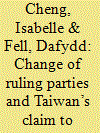

|
|
|
|
|
| Summary/Abstract |
In recent years, female marriage migration from China and Southeast Asia has significantly increased the number of foreign-born citizens in Taiwan. This article is a preliminary investigation into how political parties responded to the growing multicultural makeup of the national community between 2000 and 2012. We examine the content of the Understanding Taiwan textbook, the election publicity of the two major political parties, citizenship legislation, and the results of interviewing immigrant women. The findings show that the change in the ruling party did make differences in terms of both parties’ projection of immigrant women in election propaganda and citizenship legislation. However, inward-looking multiculturalism is practised by the two main political parties in Taiwan to forge national identity and enhance national cohesion rather than to promote the recognition of immigrants’ different cultural heritage.
|
|
|
|
|
|
|
|
|
|
|
|
|
|
|
|
| 2 |
ID:
169799
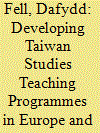

|
|
|
|
|
| Summary/Abstract |
Over the last two decades, there has been a rapid expansion in the number of Taiwan programmes at universities in America and Europe; however, few of these Taiwan programmes have attempted to develop teaching courses. Where Taiwan courses have been introduced, they have tended to be in isolation and not well integrated into existing academic programmes. Among the universities with Taiwan programmes, only two have attempted to create comprehensive teaching programmes through which students can graduate with a degree in Taiwan studies: SOAS University of London and the University of Texas at Austin. The purpose of this paper is to compare the experiences of these two institutions in developing such niche teaching programmes. It begins with a discussion of how these two programmes first emerged and then goes on to review their distinct development trajectories and key features. The paper offers an analysis of how these two programmes were able not only to survive but also to expand their offerings and thrive in an academic environment that should be hostile to such niche programmes. It concludes with a review of the remaining challenges facing these teaching programmes.
|
|
|
|
|
|
|
|
|
|
|
|
|
|
|
|
| 3 |
ID:
119198


|
|
|
|
|
| Publication |
2013.
|
| Summary/Abstract |
A central challenge for scholars of party politics is to explain parties' electoral success or failure. Campaign strategies, candidate personalities, electoral systems, parties' issue emphasis and policy positions all receive extensive coverage in the literature. One variable that has been neglected is the role of nomination systems in election results. This is surprising considering how politicians often blame candidate selection failures for disappointing electoral outcomes and then reform nomination mechanisms in the hope of improving future election prospects. In this study I examine the relationship between nomination systems and electoral results in Taiwan before and after the change in electoral systems. I show that candidate selection methods have played an important role in shaping Taiwan's party system under the old and new electoral systems.
|
|
|
|
|
|
|
|
|
|
|
|
|
|
|
|
| 4 |
ID:
074776
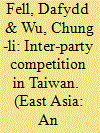

|
|
|
| 5 |
ID:
134297


|
|
|
|
|
| Summary/Abstract |
In early 2011, the Kuomintang (KMT, Guomindang) government appeared to be in danger of losing power in the upcoming presidential elections. The DPP had recovered sufficiently from its disastrous electoral performance in 2008 to pose a real challenge to Ma Ying-jeou (Ma Yingjiu) and had matched the KMT’s vote share in mid-term local elections. Ma also faced the challenge of an independent presidential candidate, James Soong (Song Chuyu), who had come a close second in 2000 and now threatened to divide the pro KMT vote. Nevertheless, the KMT was able to win reduced majorities in both the presidential and legislative elections in January 2012. This article seeks to explain how the KMT was able to hold on to power by comparing the campaign with earlier national-level elections. We are interested in identifying the degree to which the Democratic Progressive Party (DPP, Minjindang) learnt from its electoral setbacks in 2008 and whether the KMT employed a similar campaign strategy to the one that had been so effective in returning it to power in 2008. Our analysis relies of an examination of campaign propaganda and campaign strategies as well as participant observation and survey data from 2012 and earlier contests.
|
|
|
|
|
|
|
|
|
|
|
|
|
|
|
|
| 6 |
ID:
060589
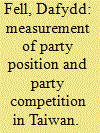

|
|
|
|
|
| Publication |
Sep-Dec 2004.
|
|
|
|
|
|
|
|
|
|
|
|
|
|
|
|
| 7 |
ID:
061223
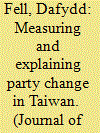

|
|
|
|
|
| Publication |
Jan-Apr 2005.
|
| Summary/Abstract |
This article examines party platform change in a third wave democratic country, Taiwan, during its first fourteen years of full multiparty elections. A variety of datasets show that Taiwan's parties have moved from polarized positions toward a moderate center on all core electoral issues. However, the parties have not converged into indistinguishable catchall parties; instead they have instituted a state of moderate differentiation. The degree to which Taiwan's parties have moderated and been electorally successful has been intimately tied to the internal balance of power between election-oriented and ideologically conservative factions or leaders. In response to public opinion and electoral competition, Tai-wan's election-oriented leaders attempted to drag their parties toward centrist positions. The key variable constraining convergent party movement and maintaining differentiation has been the strength of ideologically conservative party factions. When these ideologically oriented factions have held the upper hand in parties, they have promoted ideologically orthodox but often unpopular policies. Even when the election-oriented faction is in control at the party center, secondary factions have been able to constrain movement away from party ideals.
|
|
|
|
|
|
|
|
|
|
|
|
|
|
|
|
| 8 |
ID:
130629
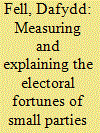

|
|
|
|
|
| Publication |
2014.
|
| Summary/Abstract |
Over the last two and half decades the Kuomintang and Democratic Progressive party have dominated Taiwan's party system. From 2008-2012 they were the only parties represented in the Legislative Yuan. Nevertheless, there have been periods in which other parties have had a significant impact on the party system. These parties have received considerable media attention during and between campaigns, won significant members of parliamentary and local assembly seats, and affected the Taiwanese political agenda. In this paper I assess the impact of these small parties on the party system and offer some explanations for their electoral successes and failure over the last decade.
|
|
|
|
|
|
|
|
|
|
|
|
|
|
|
|
| 9 |
ID:
160114
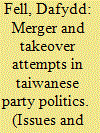

|
|
|
|
|
| Summary/Abstract |
Taiwan has experienced a number of party splits and attempted mergers since democratization. These have played a critical role in the development of the country’s party system. While a number of studies have looked at the emergence of Taiwan’s splinter parties, party mergers have not received academic attention. This study aims to systematically examine the process of party mergers and takeovers. We examine four cases of attempted mergers and takeovers. In each case, we focus the analysis around three core questions: (1) How should we best classify the actual outcomes? (2) How we can best explain the variation in outcomes? (3) How can we assess the success of merger/takeover attempts? Unlike earlier studies, we examine a variety of merger outcomes rather than just successful cases. In addition to mergers, we propose the terms negotiated takeovers and hostile takeovers. Our classification scheme is based on relative party power and the inter-party relationship. To explain the variation in outcome, we applied a framework stressing the interplay of contextual, inter-party and inner-party factors. We found key contextual variables were electoral results, relative party sizes and the electoral system. The most important inter-party variables were ideological proximity and inter-party trust following successful cooperation. Lastly, the inner-party balance of power was also critical, particularly, the strength of leaders with favorable attitudes toward the merger project. We assess the success and failure of merger/takeover attempts with reference to election results, post-merger party unity and whether the post-takeover relationship was cooperative.
|
|
|
|
|
|
|
|
|
|
|
|
|
|
|
|
| 10 |
ID:
066032
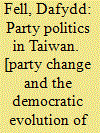

|
|
|
|
|
| Publication |
London, Routledge, 2005.
|
| Description |
xii, 183p.
|
| Series |
Politics in Asia series
|
| Standard Number |
0415359732
|
|
|
|
|
|
|
|
|
|
|
|
Copies: C:1/I:0,R:0,Q:0
Circulation
| Accession# | Call# | Current Location | Status | Policy | Location |
| 050201 | 324.251249009049/FEL 050201 | Main | On Shelf | General | |
|
|
|
|
| 11 |
ID:
067960
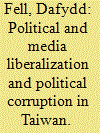

|
|
|
| 12 |
ID:
074779
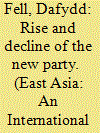

|
|
|
|
|
| Publication |
2006.
|
| Summary/Abstract |
This paper analyses the growth and decline of Taiwan's first significant third party, the New Party (NP). The NP won numerous seats in the national parliaments in the mid-1990s and received extensive media attention. However, it has shown a steady electoral decline since the late 1990s. Despite its poor recent election performance, the NP should not be regarded as a failure, as it has actually been remarkably successful at achieving its original objectives. By 2004, the KMT's policy positions had become so close to those of the NP that the NP was prepared to promote a party merger and allow its politicians to stand for election under a KMT banner. I challenge the most common explanation that the NP rose when united and fell when divided by bitter factional struggles. Instead a framework incorporating ideology, resources and political opportunity structure is employed to explain the rise and fall of the NP. I argue that when the NP faced a benign political environment in the mid-1990s, its moderate political message and rich human resources enabled the party to grow rapidly. However, after March 1996, the political environment became progressively more hostile, and as the NP's resources were eroded and wasted and the party moved towards a narrow and extremist political project, the party began its terminal decline. The space for the NP became even more limited after 2000, when party had to face intense competition from a powerful new KMT splinter party, the PFP, and a rejuvenated, united and orthodox KMT.
|
|
|
|
|
|
|
|
|
|
|
|
|
|
|
|
| 13 |
ID:
128941
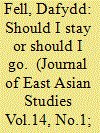

|
|
|
|
|
| Publication |
2014.
|
| Summary/Abstract |
Patterns of party switching in Taiwan have played an important role in the development and relative stability of its party system. In this study I aim to track key patterns of how politicians switched their partisan affiliation during the critical periods of party system change. I examine the level of party switching, where party switching was most prevalent, when switching was most common, and the most common types of switching since the advent of multiparty politics in Taiwan. Party switching is an important phenomenon in the development of party politics in Taiwan but thus far it has received surprisingly little systematic attention. This is the first comprehensive attempt to tackle this understudied topic.
|
|
|
|
|
|
|
|
|
|
|
|
|
|
|
|
| 14 |
ID:
066840
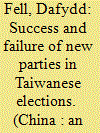

|
|
|
| 15 |
ID:
100582
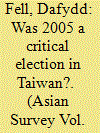

|
|
|
|
|
| Publication |
2010.
|
| Summary/Abstract |
This study applies the concept of critical elections to Taiwan's recent political history. Instead of 2008, it is argued that 2005 deserves the title of a critical election. Political developments in 2005 laid the foundations for the Kuomintang's return to political dominance.
|
|
|
|
|
|
|
|
|
|
|
|
|
|
|
|
|
|
|
|
|